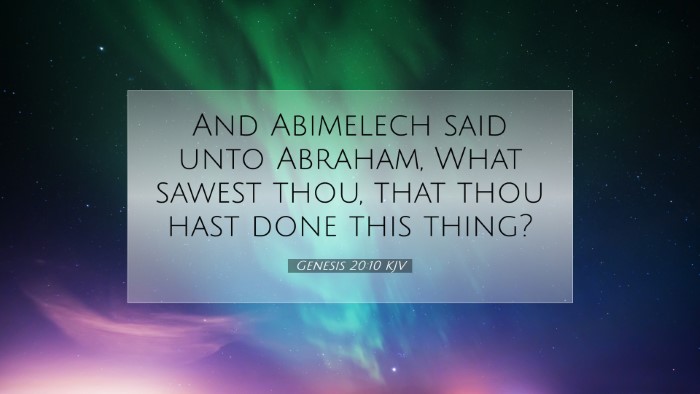Commentary on Genesis 20:10
Verse Text: "And Abimelech said unto Abraham, What sawest thou, that thou hast done this thing?"
Introduction
Genesis 20:10 presents a pivotal moment in the narrative of Abraham's life, showcasing themes of fear, deception, and the divine protection of God's chosen people. This commentary synthesizes insights from renowned public domain scholars, offering significant theological implications for pastors, students, theologians, and Bible scholars.
Contextual Background
The events surrounding this verse occur in Gerar, where Abraham sojourns due to a famine in Canaan. This passage illustrates the challenges faced by Abraham in maintaining his covenant relationship with God amidst societal pressures and personal failures.
Historical Context
- Abraham's Journey: Abraham's travels reflect not only physical movement but also spiritual testing, which re-emerges in his interactions with foreign kings.
- Societal Norms: The cultural backdrop of the Ancient Near East often revolved around honor and shame, greatly influencing Abraham’s decision to present Sarah as his sister.
Verse Analysis
Abimelech's question to Abraham serves to highlight both an ethical dilemma and a moment of divine providence. By inquiring "What sawest thou," Abimelech reveals his bewilderment at Abraham’s actions, suggesting a breach of trust between foreign nations and a moral failing on Abraham's part.
Themes Explored
- Deception and Fear: Abraham's decision to deceive stems from fear, an all-too-human reaction that places one’s reasoning above trusting in God’s promises.
- Divine Intervention: Despite Abraham’s failure, God intervenes, protecting both Abraham and Abimelech, showcasing His unwavering faithfulness.
- Ethics Among Nations: The interaction raises questions about ethical standards and the expected conduct between nations and individuals.
Theological Insights
Genesis 20:10 invites deeper reflection on several key theological themes:
1. Human Imperfection
Abraham is often depicted as a paragon of faith; yet, here he exemplifies human frailty. This duality is crucial for understanding the necessity of grace and the reality of sin, regardless of one's spiritual stature.
2. God’s Sovereignty
Abimelech’s question is a poignant reminder of God’s control over human affairs. Through man’s failure, God orchestrates outcomes for His glory and the fulfillment of His promises, reinforcing the idea that He works through imperfect vessels.
3. Ethical Living in Exile
Abraham's experience underscores the challenge of maintaining ethical conduct amidst hostility or misunderstanding. The moral ambiguities encountered prompt a reflection on how believers are to navigate similar dilemmas today.
Commentary Resources
Matthew Henry’s Insights
Matthew Henry notes that Abimelech’s inquiry sheds light on Abraham’s inconsistency, emphasizing how reliance on God should supplant fear-driven deceit. Henry encourages believers to trust in God’s provision rather than resorting to worldly tactics.
Albert Barnes' Perspective
Barnes addresses the notion of Abimelech’s righteousness in contrast to Abraham’s conduct. He highlights the significant role of Abimelech as a moral compass, questioning Abraham’s integrity even as he himself remains unwittingly ensnared in deceit.
Adam Clarke’s Commentary
Clarke elaborates on the nature of the dialogue between Abimelech and Abraham, suggesting that it reveals the profound misunderstandings that can arise from human actions. His insights encourage deeper reflection on God’s sovereignty over morality and justice.
Practical Applications
For pastors and theologians, this passage offers rich material for preaching and teaching:
- Encouragement in Failure: Highlighting that even the greatest of saints experience failure can provide hope to congregants dealing with their shortcomings.
- Trusting God’s Plan: Emphasize the importance of trusting God’s providence rather than succumbing to fear, offering practical steps for building faith in uncertain times.
- Ethical Discernment: Challenge congregants to reflect on their own interactions within their communities and the ethical implications of their decisions.
Conclusion
Genesis 20:10 encompasses profound lessons on trust, deception, and divine sovereignty. Through the interplay of Abraham’s failings and God’s steadfastness, readers glean insights into their own faith journeys. This commentary aims to equip scholars and leaders with the understanding needed to navigate the complexities of faith in today’s world.


